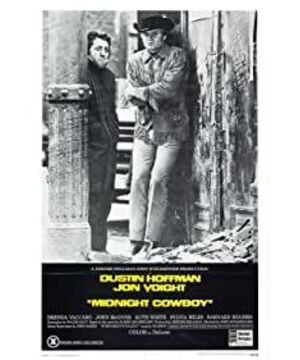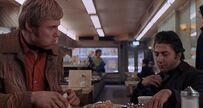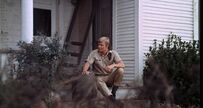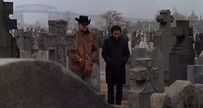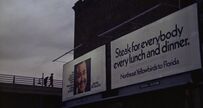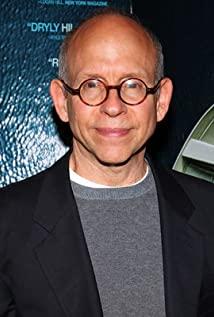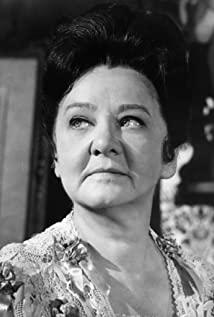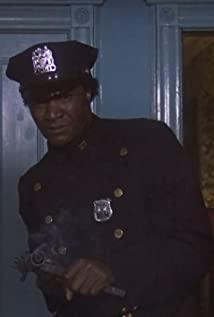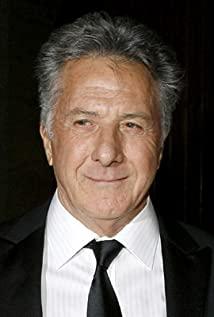Although the Oolong (the inverted insertion of the playback video component) appeared when watching the film, and the film itself has some common problems of American independent films, that is, after simple and crude character lines and contextual modeling, more meta-topics have been made. It’s like an Easter egg, but no matter what, this film is still my favorite. [First praise Dustin's acting skills! It's really acting like what, the tears and look in the eyes are much better than strong water! 】
More than one person should have said that the editing is good. The power of that bold flash, interludes and fantasy, after so long, can still impress people. The crazy rebellious message is like a storm, from the beginning to the end, all the way to the audience. Serious religion, stable social rules, a well-behaved life, modern material development, and even more essential, the conservative traditions of Hollywood, have all been vented by editors. But is it just that? Of course not, the editing of this film is far more precise than these shallow things.
First, let’s look at the script. The screenwriter has always lied to us and made us think that this is a two-player show, including the posters telling us this, but in fact, this film is a one-man show, just the life of Joe alone, and the little cripple is also It’s just a passer-by. The role is probably the same as the raped girl mentioned in the flashback. It is a footnote to Joe’s "painful" experience. If you reduce the entire experience of this character, it is similar to Tuo. In the "observed" tragedy characters in Weng's novels (beginning of "Insulted"), their own life fragments impact the narrator of the story, and at the same time they have the effect of setting the tone for the entire plot.
Let’s take a closer look. Aside from sociology, moral reflection, and contextual expression, the connotation of this film is very different from the external appearance, and it has a more universal background of compassion and compassion, and it can’t escape. , A tragedy doomed to happen. This is a classic sense of fate. Let’s pull up several flashbacks together and take a look. In fact, the protagonist of all flashbacks is Joe alone, including the one-hour fantasy in the film. It seems that the cripple is the absolute protagonist, but in fact The importance of the two in this scene is the same. And what do these do? I personally think that the black and white picture plus the fantasy is equal to the previous and just happened "emotions" (mostly negative), and the current scene cut is simply to tell the audience that the "above process" does not matter whether Joe wants it or not. , Will rush into his life. This is a kind of pain that the director shows to the audience, like being raped.
Continue to talk about how the director expressed the idea of "tragedy destined to happen", or (the overlap of two tragedies alone). The bus scene at the beginning, although it seems to be a lengthy suspicion now, does not hinder the importance of this scene. The image of the grandmother at this time has an element of patience and beauty, coupled with the appearance of priests and cowboys, and the appearance of small houses in small towns, which makes this "past living place" become true and believable. And grandmother is an extension of the big environment of "the place where we lived in the past." Later, when we followed the flashback to look for it, we would also find that the image of the priest was highlighted in the flashback after being fooled by the cripple. Why? This shows that the experience of the priest's baptism is a sad feeling of being deceived for Joe. With the panic running, the expressive power of the image is also full (of course, this is a later story.) and Joe thought later. He vented his anger but didn't do it. Instead, he added the scene of smashing the mirror when he was a child, which shows his own acceptance and tolerance of what happened just now.
Having said this, compare the experiences of the male protagonist in the past scene [Western Town] and the current scene [New York]. At least in the first act, these two {parallel time and space} are created by editing. The male protagonists in the movie are all beautiful at first, and they also have a feeling of being loved and attached to the boy’s Oedipus. After rebelling against formalism, the Lord had no choice but to accept it.
However, if this is the case, of course the film is not enough to be a god. After all, the feeling of prophecy and compassion have not been reflected yet. The place where the gods are truly enshrined lies in the second scene separated. Hey, a direct flashback presents the pain of "past time and space" before the audience, mixed with ambiguous plots, and pure fantasy about the little cripple. In this way, the tragedy of the past that the protagonist bears, and the oppression of the characters by life at the time, and even simply explain why Joe went to New York in the plot, plus the amazing mania of the scoundrel itself. , The oppressive despair brought by the dark crowd and grandma, as well as the collapse of tall buildings and the coldness of the iron nets, are too awesome. More importantly, there should be another point. The director seems to have deliberately deceived us by obscuring the little cripple, the character who is about to shine, Rick's identity. In the previous flashback, the cripple Rick represents the existence that is similar to the small town priest, who caused Joe's pain, and in the third act flashback, it represents the same as Annie, Being oppressed by this environment, the existence of the same illness and pity with Joe. The director didn't say it explicitly, but put Rick into Joe's fantasy to be with the little cowboys in the town. It symbolizes that he belongs to the "environment" (but of course not a small town), but also expresses Joe's suspicion and ignorance of him through his violent tendencies when mixing with Annie. It's really wonderful.
In the following scenes, until Rick tells Joe the fact that he is seriously ill, we can find that the two people live together, in addition to the process of mutual acceptance and tolerance, there is also Joe's observation of Rick, this element A scene in the cemetery is clearly pointed out, and through the narration of the family in the dialogue, a wonderful intertextual response to the scenes that the two of the group O party will participate in is achieved, and the decline in the moral sense at the time and the thinking are very clever Express it. And the experience constituted by these events, when Rick said he was seriously ill, gave Joe, and even us, a great shock. This is the end of a repeat, the two people who have the same illness are forced to leave.
When you get here, plus the reference of the bus scene from the back and the bus scene in front, as well as Joe's beating of the underground priest (the editing is sexually suggestive, erection and shooting O), you will find that there is a greater tragedy in it, and A scene abandoned by the protagonist, but the same is remembered by the protagonist later or many times, like a scar that bleeds from time to time. When the bus driver mentioned the phrase "no more than a minor illness", the social critique that is exclusive to the United States and the lonely life universally applied to the world were pointed out at the same time. The cleverness is also just right. And the last shot that is so sad that the beautiful picture is just a floating phantom on the dirty car window, God, it's so sad!
Alas, Henggu’s compassion and compassion can still have such a powerful impact under modern creation. This film is not said to be a masterpiece, it is at least a good product. Very recommended!
(PS, because I am afraid of being audited, I said, I will put fewer pictures. This way, it may make people feel that it is cloudy, but the people who have seen it should understand what I mean. ,Ha ha)
View more about Midnight Cowboy reviews


